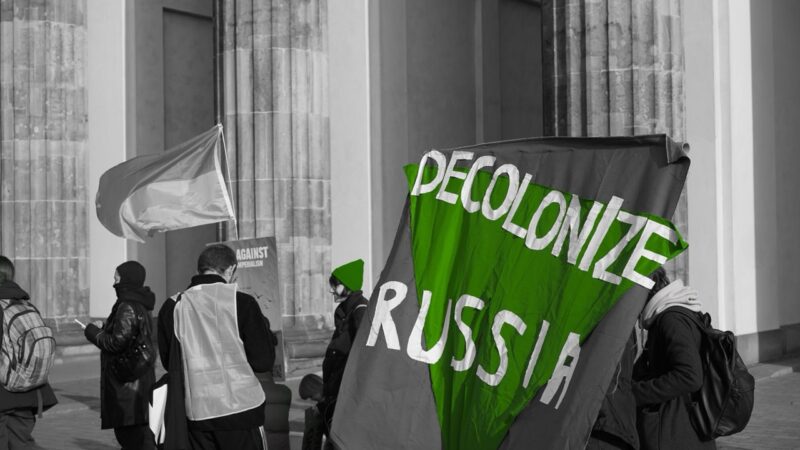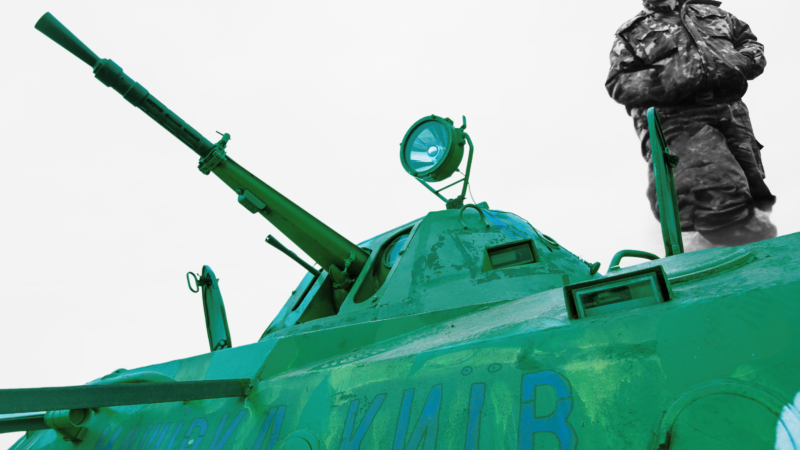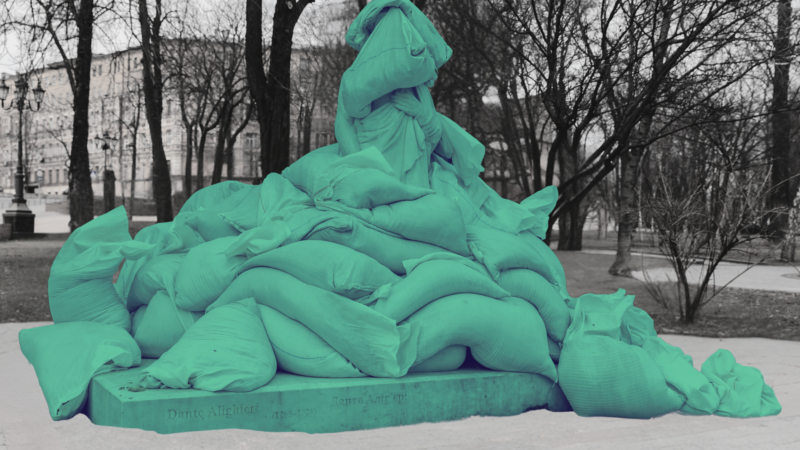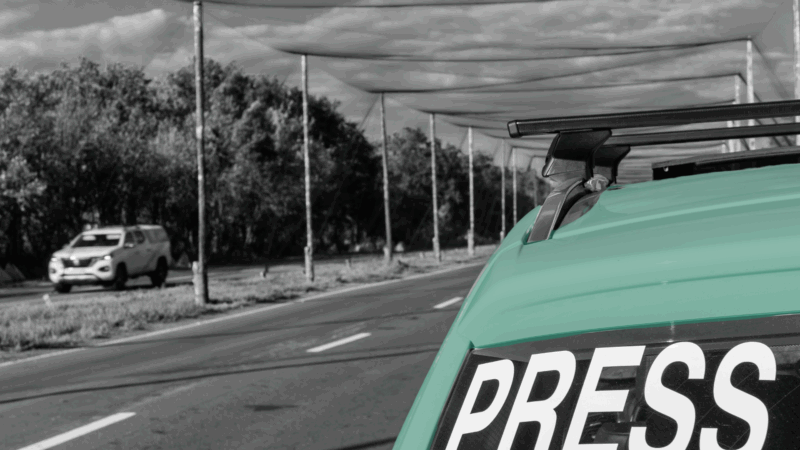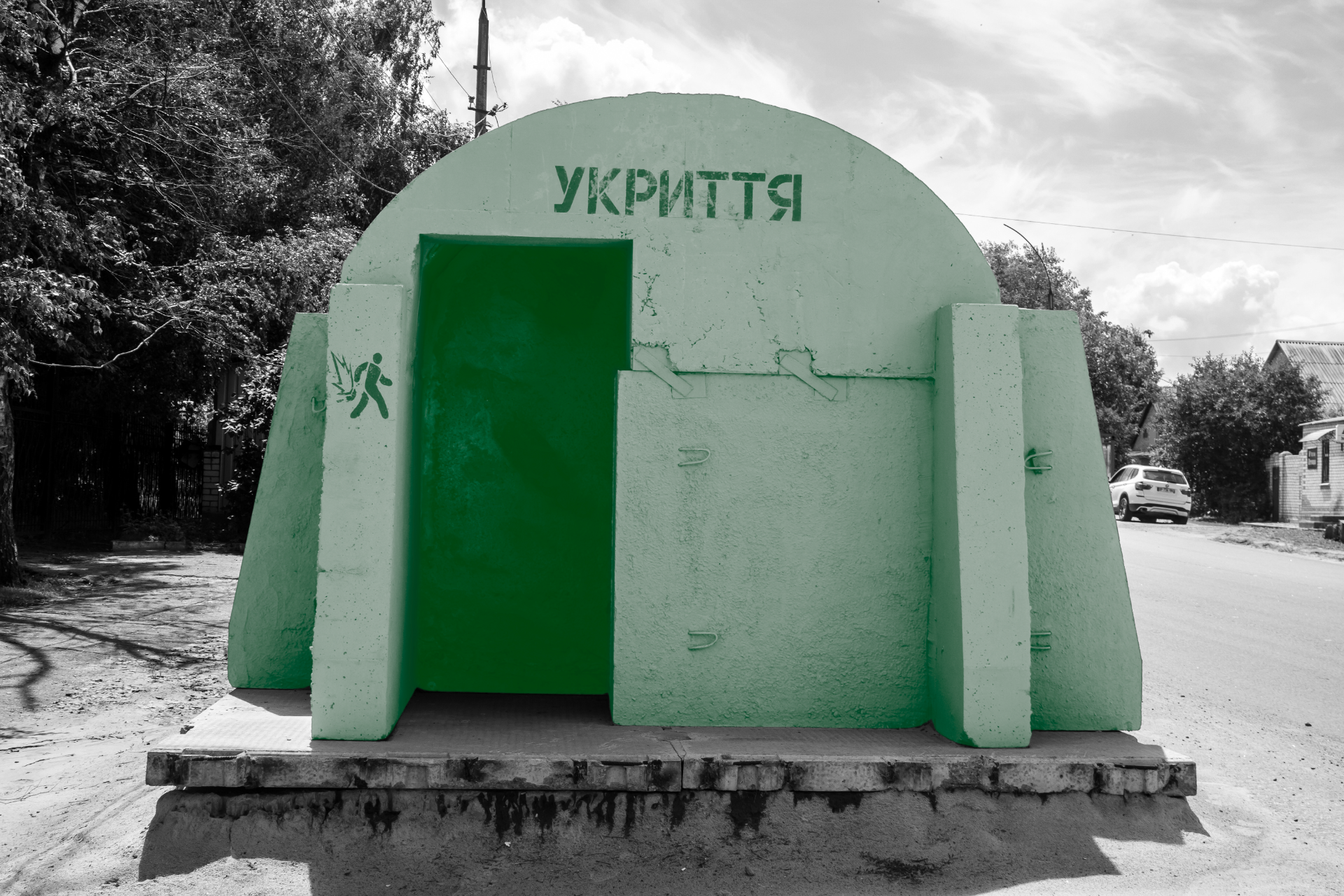Interview with Elżbieta Kwiecińska | “I hope that Ukrainians will encourage new voices in Poland”
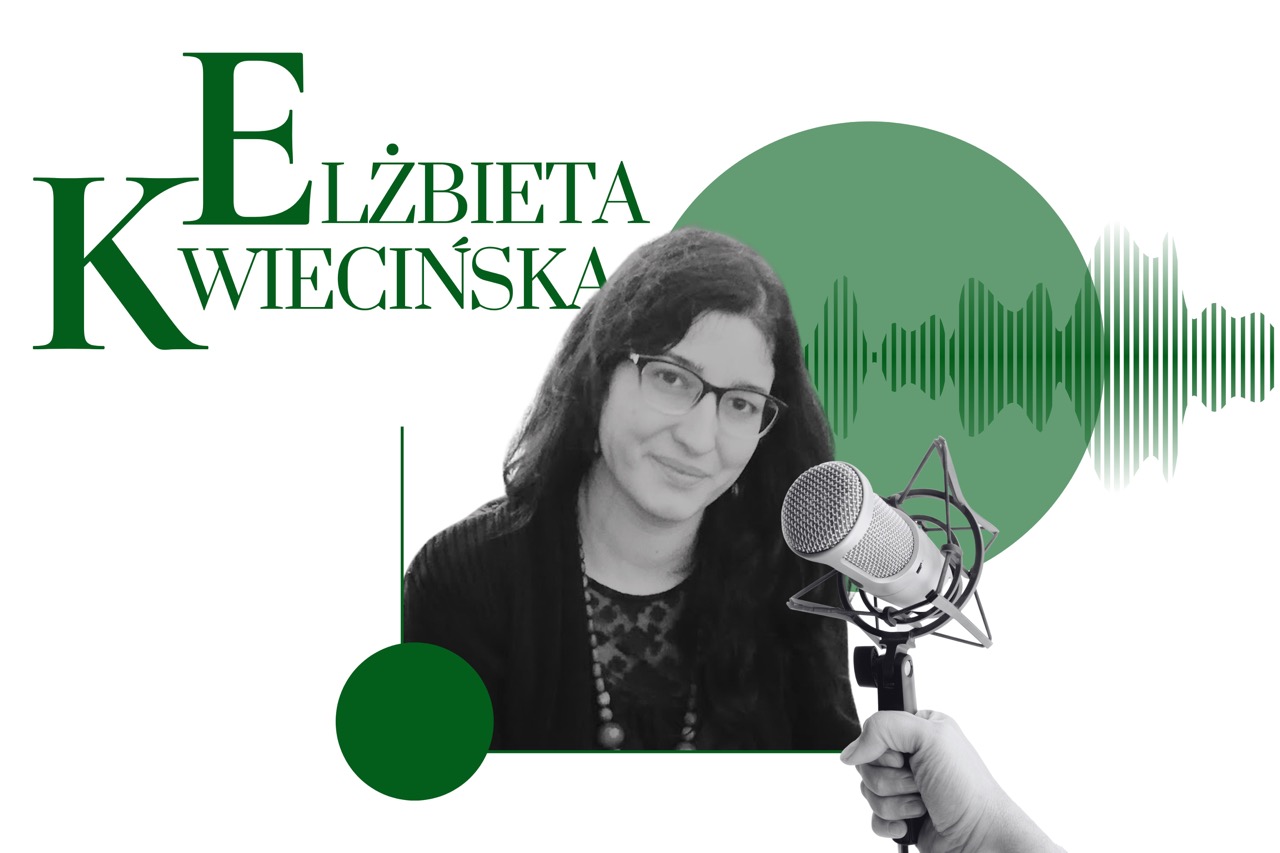
Ostap Kushnir: How has pro-Ukrainian volunteer activity evolved in Poland since February 2022? What have been your personal observations and experiences?
Elżbieta Kwiecińska: I would need to share my observations from two perspectives: as an actor and as an expert.
As an actor, my pro-Ukrainian volunteering effort has evolved from multi-tasking 24 hours a day into a more focused and structured activity. Starting from the first days of the Russian invasion, I was engaged in fundraising, purchasing protective equipment for Ukrainian soldiers (often in weird places across Poland), escorting shipments from Western Europe and the US to Ukraine, storing army equipment in my flat or my mom’s basement, hosting displaced people in my flat, and serving as a translator from Polish or English into Ukrainian or Russian. As you can imagine, at a certain point I became very exhausted.
An interesting experience for me as well as for many other Poles was using and expanding our personal networks to help Ukrainians. For instance, I do not drive, so I had to ask my friends or my mom to transport migrants and refugees from one point to another. If there was no room in my flat to shelter people, I had to ask someone else. Some Poles made tea and sandwiches, some purchased clothes and food, some met Ukrainians arriving in groups by train, and some helped them to adapt to a new location. Impressive numbers of Poles united their efforts and volunteered from February till May or June.
Having the opportunity, I want to thank my family, friends, and partner for helping me during all that time.
In May my activities began to narrow down. I stopped doing everything. Many of my friends also decided to specialize in specific tasks. For instance, Oleksii Rudenko, who once stayed under my roof, created his NGO Stand with Ukraine and started supplying the Ukrainian army with protective equipment—hundreds of items.
For three months I worked at an NGO and translated guidelines for Ukrainians about how to arrange their lives in Poland. I tried to help different kinds of people in need: migrants with Roma heritage, representatives of the LGBTQ+ communities, moms with kids, and others. They urgently required information on how to get enrolled in schools or universities, apply for medical assistance, and obtain state registration or financial support from the government.
As an expert, I see the growing interest in studying the phenomenon of the Russo-Ukrainian war, and specifically its human component, in academia. Here, it is worth mentioning the project Testimonies from the War to which I contribute. The project unites researchers from the Polish Academy of Sciences, Lviv Center for Urban History, Luxembourg Centre for Contemporary and Digital History, the University of St. Andrew in Scotland, and other institutions. We use our language and scholarly skills to create an oral history archive about Ukrainians who have fled the war to Poland.
We started doing interviews in Warsaw but are gradually moving to smaller cities and working-class neighbourhoods in order to reach a wider audience. We hope our interviews will help future researchers to get a better insight into the impact of war on human lives.
In turn, Poland’s universities and the government also started providing more targeted and organized support to the people from Ukraine. A few months ago, I became a lecturer in the Faculty of History at the University of Warsaw. I teach the history of Ukraine for Poles in Polish and Ukrainian-Polish history for Ukrainian refugee students in Ukrainian. My students fleeing the war are of different ages and backgrounds: from 16-year-old teenagers to experienced individuals, predominantly women, in their 50s. Tuition fees for academic degrees at Polish public universities have been waived for Ukrainians. In a way, everyone who wants to start a new life in Poland is offered an attractive opportunity to get a new education. Moreover, Ukrainians receive free classes in the Polish language for foreigners, and they can apply for scholarships. They enjoy equal rights with Polish students.
Offering classes in Ukrainian by my department became a significant milestone, if not a pivotal turn for the University of Warsaw, which is the most prominent university in the country. Last year, before the invasion this would have been hardly conceivable: the only foreign language of instruction was English.
In the long run, I hope that the offer targeted at Ukrainians will help to raise new voices in Poland—ones that do not belong to the ethnic majority. I also hope that after their graduation, my students will acquire cultural awareness and social tools to participate actively in Polish public life.
Finally, I think it is worth mentioning the importance of (so-called) intercultural school mentors, who are employed to support migrant children. These people are often themselves of Ukrainian heritage, who have already lived in Poland for some time and know the language. But there are many Poles among them, too. In one of the primary schools in Warsaw, where my mother works as a psychologist, they organize hours of group therapy for Ukrainian kids. Although there is a language barrier, they use art therapy and music therapy to establish contact.
Kushnir: In the summer, in his article for the Forum Andrzej Szeptycki mentioned the growing “Ukraine fatigue” in Poland. Patrice McMahon raised a similar issue in The Conversation. Will Poland exhaust its support to Ukrainians any time soon?
Kwiecińska: The fatigue exists; we all are humans, and we all get tired. Also, unlike many countries to its west, Poland has never had well-functioning and centralized mechanisms to accommodate waves of migrants. It is no surprise that Polish civil society has gotten tired, as it carries on its shoulders many functions of the state.
When migrants or refugees arrive in, for instance, Germany or the UK, they know where to go and which steps to take. In Poland the migrants often feel lost. The state’s provision of care and services is not coordinated, and that puts additional strain on local volunteers.
Notably, the other thing is that political support for Ukraine has remained invariably strong since 1989. All the major political forces in Poland wish to have a reliable neighbour to the east and develop mutually beneficial relations. In light of today’s war, there is no doubt that Poland will help Ukraine with arms and tanks, as well as promote Ukraine’s interests internationally.
A dangerous trend that I have observed is the activation of far-rights who disagree with the state’s policy of accepting Ukrainians and try to capitalize on social fatigue. They purposely nurture anti-Ukrainian attitudes, as they did against migrants from Syria and Afghanistan. They want to increase their public support, which is relatively low today, by attacking Ukrainians. Luckily, the far-rights have not been successful so far.
Another dangerous trend is that the government has lagged in creating centralized mechanisms and policies to accommodate Ukrainians. The most crucial issue where the state needs to step up is housing. The dearth of places for Ukrainians to stay is tremendous. For instance, the population of the city of Rzeszów grew by 50 per cent in the last half-year. In Warsaw, hundreds of thousands of arriving migrants and refugees have seriously undermined the real estate market: even before February 2022 it was hard for Poles to find an affordable residence in the capital, but now it is almost impossible. Therefore, I think the state should loosen the real estate tension and prioritize the provision of shelter to Ukrainians, especially in big cities.
One more domain where the state should step up is the creation of language classes for Ukrainians. For the smooth integration of a sizable wave of migrants into Polish society, these migrants must know how to communicate. Mastering the language opens doors to employment, education, and comfortable living conditions in a new place.
Kushnir: Why do you think Poland supports Ukraine so much?
Kwiecińska: Above all, Poland seems to perceive Ukraine as its alter ego. Poles look at Ukrainians and see themselves from the past. Massive armed revolutions against Russian rule started in Poland already in the 19th century. The revolutionaries failed, but they took the risk and demonstrated courage. Then there was a war in the 1920s, a more successful one. On the level of cultural memory, Poles understand what is going on in Ukraine today and why Ukrainians have chosen to fight.
Another reason behind the support of Ukrainians is the human factor. Poles simply sympathize with people who are suffering, being displaced, or have lost their property. Not to mention that many Polish families have histories of surviving the Second World War with its destruction and atrocities. Poles understand what it means to live in utterly destitute conditions caused by Russia.
Kushnir: Considering the ongoing adaptation processes and support from the government and civil society, how do you see the future of Ukrainian migrants in Poland? In your opinion, how many of them will declare Poland to be their new homeland and decline to return to Ukraine after the war?
Kwiecińska: Today, with the war being far from over, I note that some Ukrainians have taken a courageous decision and returned home. After the fighting ends, some of the Ukrainian shelter-seekers will probably leave Poland. That being said, many of them will indeed remain.
For Ukrainians to settle permanently in Poland, they need to change the perception of their new surroundings from “shelter” to “home.” They came here because they wanted to feel safe and that safety was granted by the Polish state and society. Today, their feelings toward Poland are framed by how much the state and society agree to integrate them. Ukrainians could become active members of their new communities if Poles agree to treat them that way.
The most recent challenge for many Poles resides in their unpreparedness to look at Ukrainians as equals. At this moment, the majority of Ukrainians are performing low-qualified jobs and are considered a cheap labour force. With this, Poles have no issues. However, as just a deeper social integration starts, the reaction of the Poles may be less favourable. This will likely be the end of Poland as a state with a homogeneous society. Not all Poles will find it normal to listen to non-Polish voices. To this, we should add and counter the possible irritation when Ukrainians will use their right to find a decent job, get an education, or pursue their desires and dreams in Poland.
Another challenge that I see for Ukrainians is their experience of living in a bilingual society. Polish society has been formed as monolingual. Therefore, it may be hard for ordinary Poles to feel comfortable in a situation where one person speaks in one language and the other answers differently. In turn, many Ukrainians came to Poland believing that they would be able to speak Ukrainian and Poles would respond in Polish. Communication in Poland does not work that way. This leaves Ukrainians disappointed—especially those Russian speakers who used to think that Russian was a universal language and should be comprehended in Poland.
Therefore, if Ukrainians want to integrate, they will need to learn the language. Those Ukrainians who have serious plans for Poland have already started doing so. Those who are not ready to embrace that effort will probably return to Ukraine given the opportunity. The stress from migration can be bigger in their case than the stress caused by missiles.
Kushnir: From your perspective, will the majority of Ukrainians who currently are in Poland return to Ukraine or decide to stay?
Kwiecińska: I do not know. I wish them to stay. The contribution of Ukrainians to Polish society has been and will continue to be constructive. Moreover, I think it is necessary to make Polish society more diverse and open. At the same time, I am afraid that Ukrainians will leave Poland if they find it hard to integrate, if they are not helped with at least accommodation and language classes.
Kushnir: There is a growing belief among academia that the ongoing war is the painful, yet pivotal process of Ukraine’s decolonization. Do you agree with this belief?
Kwiecińska: Yes, I do agree. Ukrainians took a step toward decolonization and now must endure the consequences. I am not sure there could be a less painful way, considering the genocidal politics of Russia, but I am sure that Ukraine will succeed. It is not only the army that is battling the former colonizer but the whole society.
I agree that the human cost of Ukraine’s decolonization is very high, but I doubt that surrender could be a better option. I also agree with those experts who claim that to have the conflict resolved quickly the West needs to send more armour to Ukraine and make Russia withdraw its army.
Russia must be defeated, as otherwise we will see new atrocities, similar to those in Mariupol, Kherson, and Bucha. Civilians should not be tortured and killed because of their national loyalty. Ukrainian kids should not be kidnapped for forcible deportation and identity reprogramming. Those who have lived through twentieth-century history may experience a clear déjà vu today. To stop it, Ukraine must win this war.
As a historian, I want to emphasize that decolonization is a process that happens in our minds. Thus, all actors engaged should stop perceiving Central Europe as a playground between the West and Russia. People from the region have their desires and needs, and such states as Ukraine have a right to choose which side to join. The US-dominated West is not a perfect place, but still, it should be the right and liberty of Ukrainians to decide if they want to part with it.
Kushnir: What circumstances should be in place to have the process of Russia’s decolonization started? What kind of decolonization will it be? What will be its domestic and international outcomes?
Kwiecińska: That is a tricky question, as it concerns predictions that have always been hard to get absolutely right. Many experts (such as Olexiy Haran – O.K.) believed that Russia would not launch a full-scale invasion in February 2022 as it would be irrational to do so. Yet, the invasion was launched.
I wish for places such as Buryatia or Tatarstan to stop being subordinated to Moscow. However, such a development requires many other preconditions to take place.
Above all, Russia must lose against Ukraine. If it happens, then Moscow’s domestic grip will weaken and that may encourage Russia’s provinces to rebel. There is a probability that Moscow has squandered so much of its power that claiming independence will become a formality. Another probability, a more troubling one, is that domestic conflicts and civil wars will erupt after the Russian Federation’s provinces claim independence, vying for control over natural resources.
Western states should weigh all the probabilities in getting ready for decolonization inside Russia; and if it takes place, in making it as painless as possible. This means that today, as I see it, the West should support liberal forces within Russia, the ones fighting corruption and advocating the rule of law. However, the West should also be aware that many Russian liberals find nothing wrong in shouting Krym nash [Crimea is ours] and supporting specific points from the imperialist agenda. It is important for the West to research whom to collaborate with.
One thing is clear to me: for domestic decolonization to start, Russia must lose the war. The death of President Putin, if such a miracle happens, will not change much in the nature of the regime. Putin’s friends or aides will easily seize power and the continuity of governance will prevail. Moreover, their attitude toward Ukraine will likely remain the same.
The political core in Moscow needs to weaken for Russian Federation’s provinces to become independent.
Kushnir: The same as Aliaksei Kazharski, you are known to be a consistent critic of the academic culture of Westsplaining. In your opinion, what are the major misconceptions that Western wannabe analysts put forward?
Kwiecińska: The primary misconception that the Westsplainers put forward is that Ukraine is a failed state. They argue that Ukraine is full of divisions, particularly between its eastern and western parts, which makes the effective rule of a single government impossible. However, I think that there is nothing wrong with having divisions. Every country has them. In Poland, for instance, a division runs between a more liberal west and a more conservative, even right-wing east. In Italy, there is a division between north and south; the way people speak in both parts is different. Yet somehow, no one is using Polish or Italian internal differences to conquer those countries.
It is normal to have diversity within one state. Moreover, it is the desire to achieve homogeneity that leads to the construction of a totalitarian state.
Another thing that the Westsplainers get wrong is Ukrainian nationalism and so-called Russophobia. It is unwise to claim that such political convictions do not exist in Ukraine. However, they are of a similar nature as the much less criticized Russian nationalism and Ukrainophobia in Russia. In times of war, making an argument that nationalist convictions are the root of the problem for Ukraine is nothing but victim blaming.
The Westplainers often perceive Central Europe, and specifically Ukraine, as a playground between global powers. They deny the region a distinct identity. The whole of Central Europe appears to them as a uniform space squeezed between Germany and Russia. Whenever the regional states take any side – for instance, to follow the US lead – the Westsplainers interpret this as an imposed move, not a sovereign choice.
Finally, the Westsplainers are very keen to project their post-nationalist conceptions on Ukraine and the region. It is very nice to sit in Berlin or in Florence, drink coffee, and philosophize in different languages on how Central European states should look and how to proceed with reconciliation. However, in Ukraine you may be killed because you are Ukrainian. This is where the post-nationalist utopia ends.
The war in Ukraine today resembles the one from the 19th century, when Europe was torn with national struggles and clashes for independence. It sometimes is hard for the Westsplainers as well as the multicultural societies they represent to understand why people in Ukraine want to fight for their nation-state instead of fostering the spirit of co-existence with Russians. They think that genuine freedom and security can be achieved only within the borders of a sovereign state an outdated one.
Kushnir: Has there been any improvement in the quality of Westsplaining recently?
Kwiecińska: Yes, I think that the Westsplainers made some progress. Many of them discovered Ukraine better. Overall, Central Europe started making more sense to them. The perception of the region as a playground was revised by many.
That being said, those Westsplainers who were not ready to acknowledge their previous misconceptions became attached to them even more. They made Ukraine-blaming a part of the professional political agenda. They started proudly presenting themselves as non-mainstream voices. Here it is important to stress that such Westsplainers are not bewildered victims of Russian propaganda but experts who have made their educated choice to support the Russian position. We should not deny their agency but rather take them seriously.
